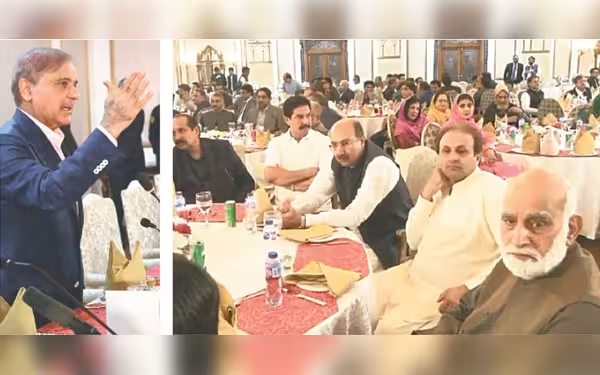Saturday, November 16, 2024 03:19 PM
PM Shehbaz Engages Allies for Judicial Reform Package
- PM Shehbaz proposes constitutional package for judiciary reform.
- Chief Justice tenure fixed at three years in proposed bill.
- Government seeks two-thirds majority for constitutional amendments.
 Image Credits: dawn
Image Credits: dawnPM Shehbaz Sharif engages allies for a constitutional package aimed at judicial reform, including a fixed tenure for the Chief Justice.
In a significant political development, Prime Minister Shehbaz Sharif has taken steps to engage all allied parties regarding a proposed constitutional package aimed at reforming the judiciary. This package includes a pivotal bill that seeks to fix the tenure of the Chief Justice of Pakistan at three years. The Prime Minister's initiative comes at a time when the political landscape in Pakistan is fraught with challenges, and the need for judicial reform has become increasingly pressing.
On Saturday, during a banquet hosted for coalition lawmakers, PM Shehbaz emphasized the importance of unity among the ruling alliance. He urged lawmakers to ensure their presence in both the Senate and the National Assembly, as the constitutional package is expected to be introduced in parliament on Sunday. A source who attended the meeting revealed that the package would first be presented in the federal cabinet meeting for approval before being tabled in parliament.
In addition to discussing the constitutional package, PM Shehbaz held a separate meeting with his legal team to address a recent Supreme Court decision. This ruling ordered the Election Commission of Pakistan to restore 41 reserved seats for the Pakistan Tehreek-i-Insaf (PTI), which has complicated the government's plans. Despite the usual practice of not holding sessions on holidays, both houses of parliament convened on Saturday, indicating the urgency of passing the constitutional package without delay.
It is noteworthy that the dinner meeting convened by PM Shehbaz was attended by leaders from all allied parties, with the exception of the Pakistan Peoples Party (PPP). The PPP's chairman, Bilawal Bhutto-Zardari, was hosting a separate dinner for his party's legislators at the same time. Furthermore, some lawmakers from the ruling coalition were reportedly out of the country, which contributed to the decision to delay the tabling of the constitutional package by one day.
PM's Adviser on Law, Barrister Aqeel, reassured reporters that the Supreme Court's verdict regarding PTI's reserved seats would not hinder the tabling of the constitutional package. He claimed that the government possesses the necessary votes to pass the legislation. Senator Irfan Siddiqui of the Pakistan Muslim League-Nawaz (PML-N) echoed this sentiment, stating that the government enjoys a two-thirds majority in both houses, which is crucial for the passage of the package.
The proposed constitutional amendment bill aims not only to fix the Chief Justice's tenure but also to increase the number of Supreme Court judges from 17 to 23. This increase is intended to address the backlog of cases that has plagued the judiciary. However, there remains uncertainty regarding the retrospective application of the new legislation, particularly concerning whether it will take effect from the appointment of Chief Justice Faez Isa or from the date of its passage by parliament.
For the constitutional package to be successfully passed, the government requires a two-thirds majority, which translates to 224 votes out of a total of 336 members in the National Assembly. Currently, the ruling coalition holds 212 seats and is looking to secure support from the Jamiat Ulema-e-Islam (F) and a few opposition members to achieve the necessary majority. Despite warnings from three mainstream opposition parties about potential consequences for members who support the package, there are reports circulating on social media about certain PTI lawmakers who may be willing to back the ruling coalition.
The proposed constitutional package represents a critical step towards judicial reform in Pakistan. As the political landscape continues to evolve, the outcome of this initiative will not only impact the judiciary but also the broader governance framework in the country. The coming days will be crucial as the government seeks to navigate the complexities of coalition politics while striving to implement meaningful reforms.













